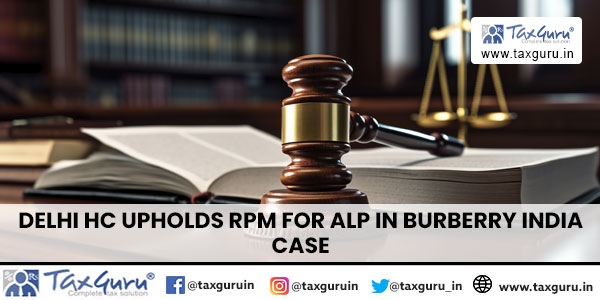Delhi High Court upheld RPM as the Most Appropriate Method for determining the arm’s length price (ALP) in the case of PCIT Vs Burberry India Pvt. Ltd. ; ITA 471/2019; 24/10/2024
Summary: The Delhi High Court upheld the Resale Price Method (RPM) as the Most Appropriate Method (MAM) for determining the arm’s length price (ALP) of transactions involving Burberry India Pvt. Ltd., a distributor reselling products from an Associated Enterprise (AE) without modifications. The Court rejected the Revenue’s appeal, which argued that high advertising, marketing, and promotion (AMP) expenses disqualified Burberry as a routine distributor, thus favoring the Transactional Net Margin Method (TNMM). The bench found no substantial question of law in the Revenue’s challenge and upheld the Tribunal’s findings. Precedents, including cases involving L’Oreal India, Matrix Cellular, and Nokia India, supported the decision. This ruling clarifies transfer pricing methodologies for similar cases and limits arbitrary challenges by tax authorities.

The Delhi High Court recently provided relief to Burberry India by upholding the Resale Price Method (RPM) as most appropriate method (MAM)for evaluating transactions involving distributors reselling Associated Enterprise (AE) products without modifications. The bench, comprising Justices Mr. Vibhu Bakhru and Justice Ms. Swarana Kanta Sharma, upheld the decision of the Tribunal, rejecting the Revenue’s appeal. The Court found no merit in the argument that Advertising, Marketing, and Promotion (AMP) expenses rendered/ disqualified the assessee as a routine distributor. It concluded that no substantial question of law arose in the case and found the Tribunal’s findings consistent with the facts presented. Consequently, the Revenue’s appeal was dismissed, holding that:
40. There is no cavil that the AMP activities are a part of the functional profile of the assessee…..
41. In view of the above, we find no merits in the Revenue’s challenge to the decision of the learned Tribunal. No substantial question of law arises in the present appeal.
[Emphasis Supplied]
The primary issue in this case was whether the RPM or the Transactional Net Margin Method (TNMM) was the suitable method for determining the ALP. The Transfer Pricing Officer (TPO) and Dispute Resolution Panel (DRP) rejected the RPM, citing Burberry India’s significant advertising, marketing, and promotion (AMP) expenses, which they argued disqualified it as a routine distributor.
However, ITAT determined that the RPM was indeed the most appropriate method for transactions where the distributor does not add value to the products. The Delhi High Court upheld this conclusion, stating that Burberry India’s functional profile as a distributor was consistent with the RPM’s application. The court referenced precedents, including L’Oreal India Pvt. Ltd., Matrix Cellular International Services Pvt. Ltd. and Nokia India (p) Ltd., to reach its decision. The decision provides much needed certainty to one of the vexed questions in transfer pricing study of key international transactions and would work as an effective deterrent on the tendency of some tax officer’s to unduly tinker with the TP analysis undertaken by the taxpayers.





